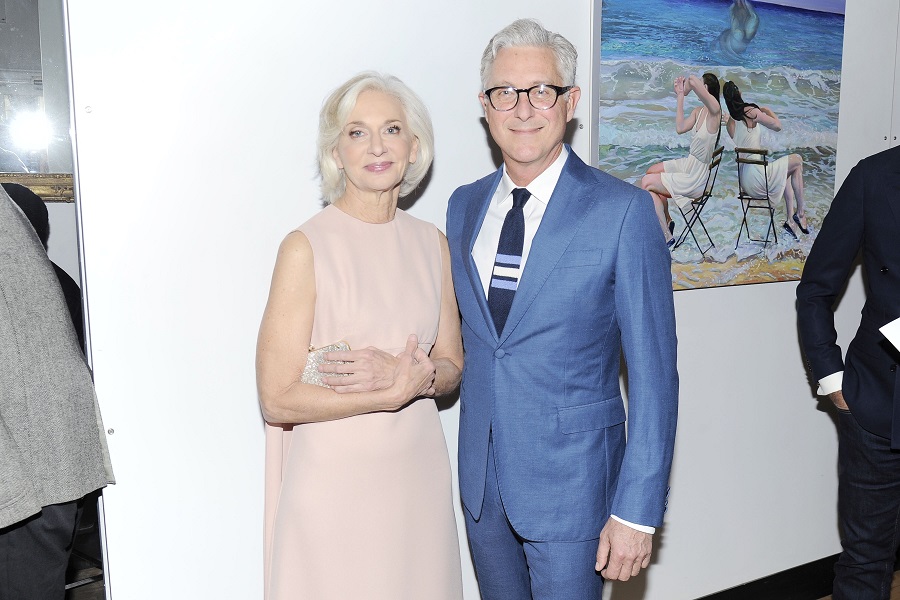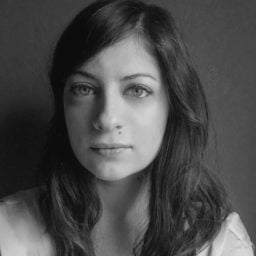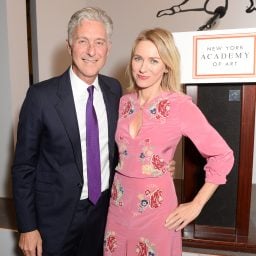The New York Academy of Art is firing back at Maria Farmer, a graduate who accused the institution of enabling the predations of the late sex offender Jeffrey Epstein, a former academy board member who she says sexually assaulted her and her younger sister in the 1990s.
The academy—a private art school with an emphasis on figurative painting that was cofounded by Andy Warhol—commissioned a law firm to investigate Farmer’s allegations that the chair of its board of trustees, Eileen Guggenheim, introduced her to Epstein and encouraged her to maintain a relationship with him because he was an important donor to the academy.
The report, compiled by attorney Jim Walden of the firm Walden Macht and Haran and released publicly today, claims that “a number of these allegations are contradicted by Farmer’s own sworn statements, as well as by other witness testimony.” (The same attorneys also recently represented Guggenheim and the academy as legal counsel when Farmer’s allegations came to light, but say they severed that relationship when they commenced this investigation.)
The attorneys reviewed thousands of emails and conducted around 20 interviews with academy board members, students, and alumnae. But instead of turning up significant new information concerning Epstein’s seven-year relationship to the academy, they focus primarily on variations in Farmer’s media and court statements as evidence of her “dubious credibility” and proof that Guggenheim “played no role” in her interactions with Epstein.
‘Full Confidence’
The academy’s board says it commissioned the report out of concern for Farmer and her troubling allegations about Guggenheim and the school. “Because the academy stands in solidarity with all people who have bravely come forward to expose the truth about the horrific actions of abusers, it took measures to investigate Maria Farmer’s allegations in order to assess whether they necessitated further action,” reads a statement from the board.
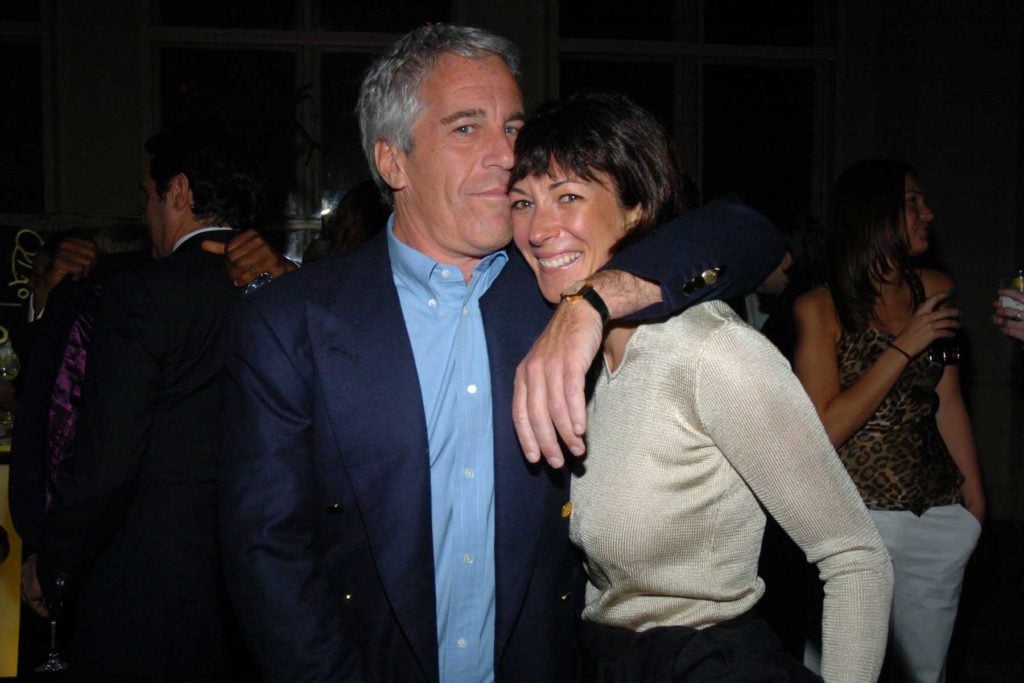
Jeffrey Epstein and Ghislaine Maxwell in 2005. ©Patrick McMullan. Photo: Joe Schildhorn/PMc, courtesy of Getty Images.
Based on the investigation’s findings, the board now says “that critical aspects of Farmer’s allegations against Guggenheim are untrue.” It has therefore issued “a vote of full confidence in its board chair, Eileen Guggenheim, and has asked her to remain in that position.”
The attorneys do not dispute Farmer’s or her sister, Annie Farmer’s, claims that Epstein assaulted them, “which we presume to be true.” They do suggest, however, that Maria Farmer—who took a job as Epstein’s assistant after meeting him at her graduate thesis exhibition—is responsible for her then-teenage sister’s assault. Farmer had witnessed young girls going in and out of Epstein’s apartment while working for him, the report notes, yet she “ignored this and the many other red flags, which would have suggested to a reasonable person that introducing her 15-year-old sister to Epstein might end badly. Unfortunately, it did.”
Side-by-Side Statements
From 1987 to 1994, Epstein maintained a “limited role” on the academy’s board and was “not a particularly active member,” the report says. He hosted at least two board meetings, but “participated minimally in board discussions and would often leave the room during meetings.”
Farmer first met Epstein at her 1995 thesis show at the academy. She told Artnet News that Guggenheim, who was then dean of students, made the introduction to Epstein and his companion, Ghislaine Maxwell, and urged her to sell a painting to the couple at a discounted price because “‘they are great benefactors of the academy.'” Guggenheim denies that she ever made this introduction or encouraged Farmer to sell work to Epstein.
The report offers as evidence of Guggenheim’s assertion a statement from an anonymous alum who also sold work to Epstein that night and said that Guggenheim wasn’t involved in the transaction. It also notes that Farmer told Artnet News and the New York Times that the painting she sold to Epstein was one inspired by Edgar Degas’s The Rape, while she said in a recent Netflix documentary, Jeffrey Epstein: Filthy Rich, that the painting she sold him was from a different series.
Farmer did not respond to a request for comment.
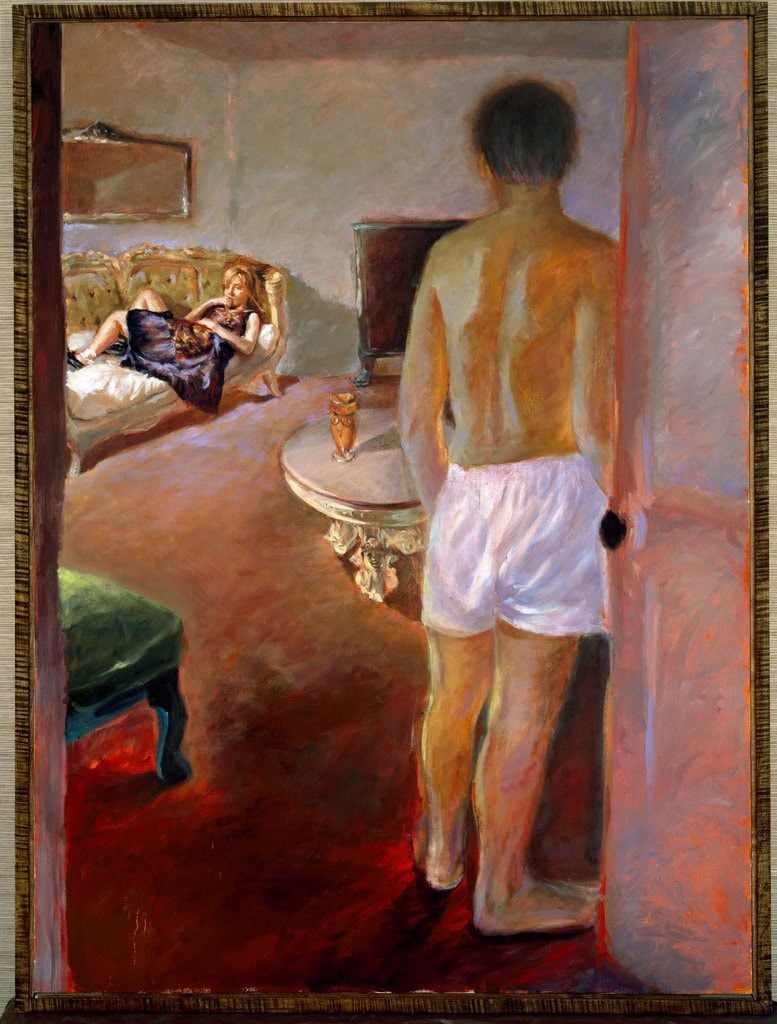
A painting by Maria Farmer that she said Epstein bought from her thesis show at the New York Academy of Art.
The report draws on more subtle discrepancies elsewhere, including in Farmer’s recollection of a visit that she, other academy alumnae, and Guggenheim paid to Epstein’s New Mexico ranch back in the summer of 1995.
“Farmer has characterized the visit to Epstein’s ranch as a ‘dinner party,'” the report says. “However, evidence supports that the visit occurred during the daytime.” Meanwhile, Farmer recalls Ghislaine Maxwell wearing tweed that day, but another alum remembered her in black. And while Farmer has characterized the encounter as disturbing, a picture taken that day of the alumnae posing next to a truck and smiling is presented in the report as “photographic evidence” that she “enjoyed the experience.”
Guggenheim has also given conflicting reports of the trip. Initially, she told Artnet News that she had never been to Epstein’s ranch, and therefore Farmer’s account was “a serious mischaracterization.” But after another alumna on the trip came forward to corroborate Farmer’s story to Artnet News, Guggenheim reversed her claim, admitting that she had in fact been to Epstein’s property that day with the alumnae. (The report does not dispute this.)
“It is time for the school to close the book on this issue,” says academy president David Kratz in a statement. “It drained a significant amount of time, energy, and financial resources over the past year that would otherwise have gone to the benefit of our students. Our reputation was assaulted, our staff and faculty were harassed, and, despite having dedicated the past 30 years to helping the school thrive, our board chair was subjected to unfair public attacks. We stand with all victims of abuse and believe their voices should be heard. But, in this case, the academy was not the perpetrator.”
Another focus of the report is a visit that Farmer made in 1996 to the Ohio estate of Leslie Wexner, the billionaire ex-CEO of Victoria’s Secret, where she says she was assaulted by Epstein and Maxwell. She claims she then called Guggenheim and told her what happened, but that Guggenheim blamed her for the assault and hung up.
Guggenheim denies that Farmer ever called her from Ohio. The report did “not find any information” about whether the call did or did not take place, but noted that Farmer has recounted the alleged conversation to media outlets with varying degrees of specificity (sometimes mentioning her sister too, sometimes not), which it says raises “concerns about either her candor or memory.”
Instead, Guggenheim says that Farmer only mentioned the trip later, once she was back in New York, telling Guggenheim that “the creepiest thing happened” to her with Epstein in Ohio. Guggenheim told the investigators that she “responded by telling Farmer, ‘don’t put yourself in those kinds of situations.'”
In its statement about the report, the board says it “extends its sympathies to Maria Farmer and her family.”
